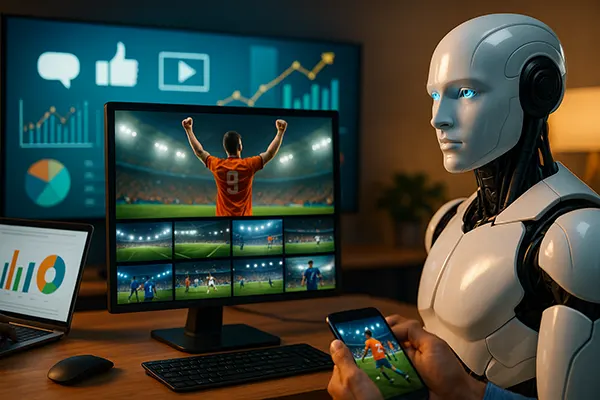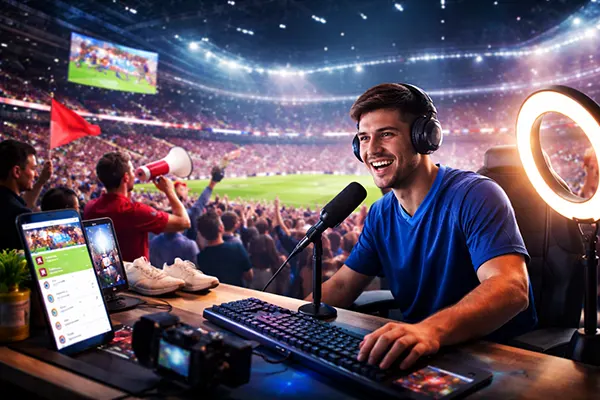
How Generative AI Transforms Personalised Content in Sports and Marketing
Generative artificial intelligence (AI) is revolutionising the sports and marketing industries in 2025. Instead of relying on traditional templates, teams and brands now use adaptive systems that tailor every message, video, or image to the individual fan or customer. This shift has transformed how audiences engage with content, leading to higher loyalty, emotional connection, and measurable growth in digital presence.
From Template Content to Adaptive Storytelling
For years, sports organisations and marketers relied on standardised campaigns. Today, generative AI allows communication that evolves in real time. Algorithms process vast amounts of behavioural data—from ticket purchases to social media engagement—and transform it into personalised narratives. Each fan can receive a different email, video, or caption that feels as if it was made just for them.
For example, football clubs now send tailored match previews featuring favourite players, while sponsors use AI to suggest relevant offers based on supporter profiles. This approach creates a human connection between brand and audience, as fans no longer consume generalised content but experience unique digital interactions. More insights on creative AI applications in marketing can be found at https://streamerfame.com/, where innovation, engagement, and strategy meet in the era of data-driven communication.
In marketing, adaptive storytelling also helps brands stay relevant. AI can analyse market trends, identify audience moods, and instantly adjust messaging tone or visuals. It’s not about replacing creativity—it’s about enhancing it through data-informed insights.
Case Studies: Teams and Brands Using Generative AI
Manchester City and FC Barcelona have integrated AI tools to personalise fan engagement through video content. These systems automatically generate highlight reels based on a fan’s most-watched players or memorable matches. In the United States, the NBA uses AI-generated commentary and customised recaps for social media audiences, making every post more relevant.
Outside sports, global brands like Nike and Adidas employ AI-driven systems to design adaptive ads. For example, AI can generate different product visuals depending on user demographics, preferences, or even local weather. The result is higher engagement and stronger brand recall without the need for hundreds of separate manual campaigns.
Such strategies demonstrate how generative AI has evolved from a futuristic concept into a daily tool that transforms fan experience and content efficiency across industries.

Avoiding Ethical and Creative Pitfalls
Despite its advantages, AI-generated content raises ethical challenges. Questions of authorship, data privacy, and factual accuracy remain crucial. When AI creates video narratives or social posts, it is essential for organisations to disclose how these materials are generated and ensure that data used for personalisation is handled responsibly.
Transparency is key: brands must communicate clearly when automated systems are involved. Equally important is the need for human oversight. While AI can produce impressive visuals and copy, professionals still play a vital role in verifying facts, maintaining authenticity, and preserving emotional nuance in messaging.
To maintain public trust, marketing teams increasingly apply verification layers and integrate ethical frameworks aligned with the principles of Experience, Expertise, Authoritativeness, and Trustworthiness (E-E-A-T). This ensures that creativity and technology coexist within responsible boundaries.
AI Tools Shaping Modern Content Creation
In 2025, a wide range of AI tools supports creative professionals. Platforms like ChatGPT, Jasper, and Copy.ai are used for text generation and marketing copy, while Midjourney, Runway, and Pika Labs offer advanced solutions for image and video creation. Sports analytics teams employ AI systems such as WSC Sports or Reely to automatically generate personalised highlight videos within seconds after a match.
These tools allow marketers to produce relevant content faster while maintaining consistency and tone. They also help smaller organisations compete with major brands by reducing production costs and streamlining creative workflows.
Ultimately, generative AI has become a strategic partner, not just a technical tool. By merging human creativity with algorithmic precision, it enables content that is both intelligent and emotionally engaging—reshaping the future of sports communication and marketing worldwide.
Last posts
-
 Dynamic ticket pricing without losing fan ...
Dynamic ticket pricing without losing fan ...
Dynamic pricing is now common across sport and …
-
 Creator Partnership Economics in Sport: Ho...
Creator Partnership Economics in Sport: Ho...
Creator partnerships have become a core line item …
-
 How Sports Clubs Use First-Party and Zero-...
How Sports Clubs Use First-Party and Zero-...
The gradual removal of third-party cookies has forced …
